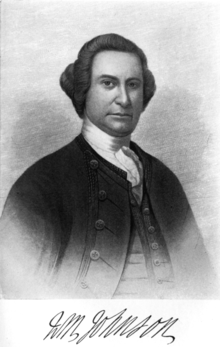
Back ويليام جونسون (ضابط) Arabic ويليام جونسون (دبلوماسى من جمهوريه ايرلاندا) ARZ Уилям Джонсън Bulgarian William Johnson, 1. Baronet German William Johnson Spanish ویلیام جانسون، بارونت اول Persian William Johnson (baronetti) Finnish William Johnson French William Johnson Italian ウィリアム・ジョンソン (初代準男爵) Japanese
Sir William Johnson | |
|---|---|
 Sir William Johnson in 1763, based on a lost portrait by Thomas McIlworth[1] | |
| Personal details | |
| Born | c. 1715 County Meath, Ireland |
| Died | 11 July 1774 (aged 58–59) Johnstown, New York |
| Military service | |
| Allegiance | Great Britain |
| Branch/service | British Army |
| Years of service | 1744–1774 |
| Rank | Major-general |
| Commands | Expedition to Crown Point Expedition to Fort Niagara |
| Battles/wars | |
Major-General Sir William Johnson, 1st Baronet (c. 1715 – 11 July 1774), was a British Army officer and colonial administrator from Ireland known for his military and governance work in British colonial America.
As a young man, Johnson moved to the Province of New York to manage an estate purchased by his uncle, Royal Navy officer Peter Warren, which was located in territory of the Mohawk, one of the Six Nations of the Iroquois League, or Haudenosaunee.
Johnson learned the Mohawk language and Iroquois customs, and was appointed the British agent to the Iroquois. Johnson commanded Iroquois and colonial militia forces against the French and their allies during the French and Indian War (1754–1763). His role in the British victory at the Battle of Lake George in 1755 earned him a baronetcy of New York. His capture of Fort Niagara from the French in 1759 brought him additional renown.
Throughout his career as a British official among the Iroquois, Johnson combined personal business with official diplomacy, acquiring tens of thousands of acres of Native land and becoming very wealthy.
- ^ Flexner, James Thomas (1959). Mohawk Baronet: A Biography of Sir William Johnson. Syracuse University Press. p. 292. ISBN 978-0-8156-0239-2.